Quick Takeaways
- VSCDEX is a niche exchange that barely appears in any major 2025 rankings.
- Fees are opaque; the platform does not publish a clear maker‑taker schedule.
- No public audit or regulatory license can be verified as of October2025.
- Liquidity is limited - most trading pairs show sub‑$5million daily volume.
- Best suited only for users chasing a very specific token that is listed exclusively on VSCDEX.
When you hear the name VSCDEX is a cryptocurrency exchange that markets itself as a hybrid between a centralized order‑book and a decentralized settlement layer. It claims to offer low fees, fast onboarding, and a multi‑chain asset pool, but the lack of independent coverage makes it hard to verify those promises. This review pulls together what little public data exists, compares the platform to industry heavyweights, and points out the red flags you should watch before depositing any funds.
What Is VSCDEX?
The only concrete source that actually mentions VSCDEX is a single review on Cashbackforex.com, which gives the exchange a brief pros‑cons list and a star rating. Beyond that, VSCDEX does not appear in SoluLab’s "10 Best P2P Crypto Exchanges for 2025," Koinly’s "20 Best No‑KYC Crypto Exchanges (October 2025)," Money.com’s top‑exchange roundup, or CoinBureau’s October 2025 picks. In short, the platform is flying under the radar of the mainstream crypto press.
Technical specifications are vague. There is no publicly available whitepaper, no audited smart‑contract code, and no detailed API documentation. The platform’s website (when reachable) lists a handful of trading pairs - primarily low‑cap tokens - and mentions support for Ethereum, Binance Smart Chain, and Polygon networks.
Core Features & Claims
Based on the limited marketing material, VSCDEX advertises the following features:
- Hybrid order‑book: Users see a traditional order‑book UI but settlements are claimed to happen on‑chain.
- Multi‑chain deposits: Supports ERC‑20, BEP‑20, and Polygon assets.
- Low‑fee promise: No specific percentages disclosed; the site simply says “competitive fees.”
- KYC policy: The website says KYC is required for fiat withdrawals, but it does not detail the verification steps.
- Security: VSCDEX states that funds are stored in “cold wallets” and that the platform follows “industry‑standard encryption,” yet no third‑party audit reports are linked.
In the absence of transparent data, each claim must be taken with caution. For example, most reputable exchanges publish a fee schedule that includes maker and taker rates, withdrawal costs, and any hidden charges. VSCDEX’s silence on these numbers is itself a data point.
How VSCDEX Stacks Up Against the Big Players
To give you a sense of where VSCDEX fits, here’s a side‑by‑side comparison with three widely used exchanges - Coinbase (a US‑based centralized exchange known for beginner‑friendly UI and regulatory compliance), Kraken (offers low fees and advanced trading tools, with a strong focus on security), and Uniswap (the original decentralized exchange on Ethereum, famous for its automated market maker model). The table highlights the metrics most users check before signing up.
| Metric | VSCDEX | Coinbase | Kraken | Uniswap |
|---|---|---|---|---|
| Founded | 2023 (estimated) | 2012 | 2011 | 2018 |
| Regulatory licensing | None publicly verified | NYDFS, FCA, etc. | Multiple EU licenses | None (decentralized) |
| Supported assets | ~20 low‑cap tokens | 200+ coins & tokens | 100+ coins & futures | ~5,000 tokens |
| 24‑h volume (USD) | ~$3million | $30billion | $12billion | $6billion |
| Fees (maker/taker) | Undisclosed | 0.00%‑0.60% | 0.00%‑0.26% | 0.30% (flat) |
| KYC required? | Yes for fiat, unclear for crypto | Yes (full) | Yes (tiered) | No |
| Security audits | None posted | Regular third‑party audits | Annual audits | Open‑source code, community audits |
| Customer support | Email only, response time unknown | 24/7 live chat + phone | Ticket system, live chat | Community forums |
From the table you can see why VSCDEX rarely makes the top‑10 lists. Liquidity, asset breadth, and regulatory compliance are dramatically lower than the established players.
Pros and Cons
Even a small platform can have a niche advantage. Here’s a balanced look:
- Pros
- May list obscure tokens unavailable elsewhere.
- Hybrid UI feels familiar to traders used to centralized order books.
- Potentially lower fees if the platform eventually publishes a lean schedule.
- Cons
- Very limited trading volume - slippage can eat into profits.
- No public security audit; cold‑wallet claims are unverified.
- Regulatory status unclear; could be shut down without notice.
- Customer support appears minimal.
- Lack of educational resources or onboarding guides.
Who Might Actually Benefit?
If you’re a trader who needs access to a specific low‑cap token that only VSCDEX lists, the platform could serve a short‑term purpose. For most users - beginners, institutional investors, or even seasoned day traders seeking depth - the cons outweigh the narrow upside.
Red Flags & Safety Checklist
Before you click “Deposit,” run through this quick safety test:
- Check if the exchange is registered with any financial regulator (e.g., FCA, CySEC). If not, treat it as a high‑risk venue.
- Search for a third‑party audit report. Absence is a warning sign.
- Look up the daily trading volume on a site like CoinGecko. Volumes under $10million indicate low liquidity.
- Read community chatter on Reddit or Twitter. A silent community often means few active users.
- Test the withdrawal process with a tiny amount (e.g., $10). Delays or denial are common red flags.
How to Get Started - Step‑by‑Step
If you decide to give VSCDEX a try, here’s a practical walkthrough:
- Visit the official website and click “Sign Up.”
- Enter your email address and create a strong password (use a password manager).
- Verify your email through the link that arrives in your inbox.
- Complete the KYC form - upload a government‑issued ID and a selfie. Keep an eye on processing time; users report delays of 1‑3days.
- Enable two‑factor authentication (Google Authenticator works best).
- Deposit a small amount of an accepted crypto (e.g., ETH on the Ethereum network). Copy the deposit address carefully.
- Once the funds appear, navigate to the “Trade” tab, select your desired pair, and place a limit order to control slippage.
- When ready to cash out, use the “Withdraw” feature, enter your external wallet address, and confirm with 2FA.
Remember: start with a tiny amount you can afford to lose, especially on a platform with limited track record.
Final Verdict
In the crowded 2025 crypto‑exchange landscape, VSCDEX looks more like a footnote than a contender. Its lack of transparency, scant liquidity, and missing regulatory credentials place it firmly in the “high risk” bucket. Unless you have a very specific token need, you’re safer choosing a well‑established exchange that openly publishes fees, audit results, and licensing information.
Frequently Asked Questions
Is VSCDEX a regulated exchange?
No public regulator list can be found for VSCDEX. Unlike Coinbase or Kraken, the platform does not display any licensing numbers, so it should be treated as unregulated.
What fees does VSCDEX charge?
The website only mentions “competitive fees” and does not publish a maker‑taker schedule. Users report hidden withdrawal fees, but exact percentages are not disclosed.
Can I trade without KYC on VSCDEX?
KYC is required for fiat withdrawals, and the platform hints at verification for crypto deposits as well. There is no clear “no‑KYC” option.
How does VSCDEX’s security compare to larger exchanges?
Larger exchanges publish third‑party audit reports and have insurance funds. VSCDEX only claims “cold‑wallet storage” without any audit, making its security posture uncertain.
Is there a mobile app for VSCDEX?
As of October2025, VSCDEX offers only a web‑based interface. No official iOS or Android apps are listed.

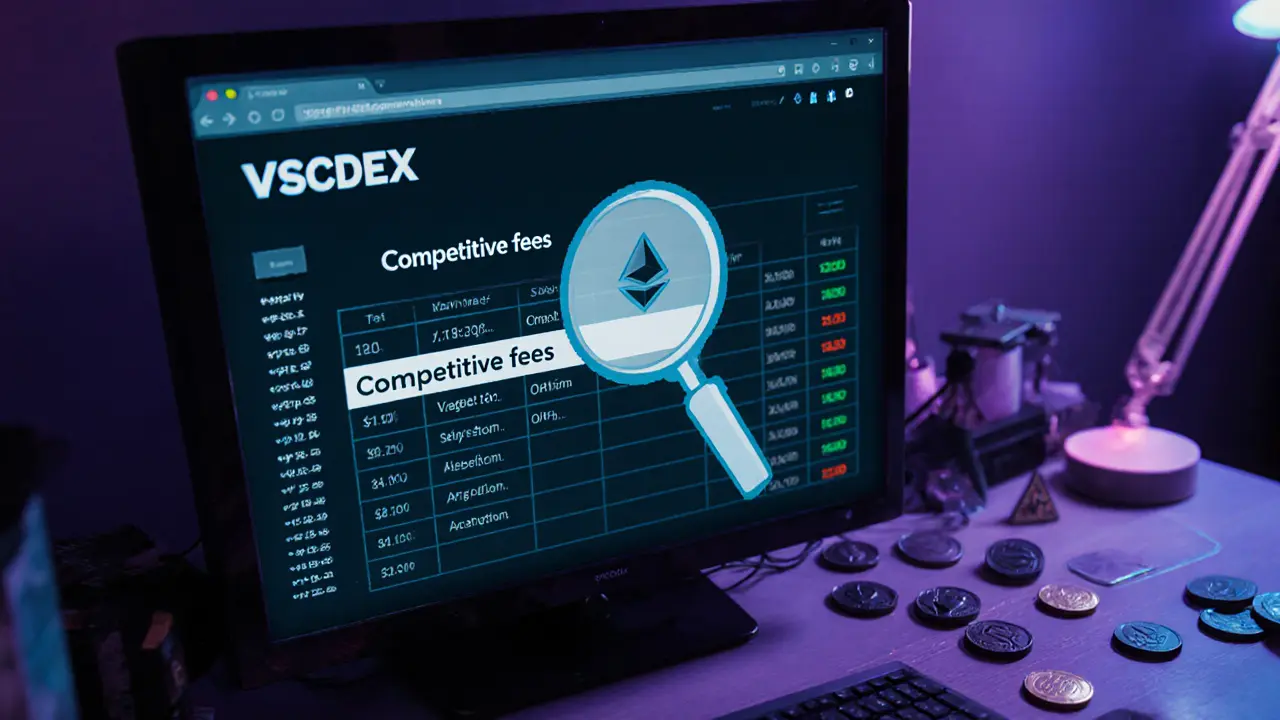

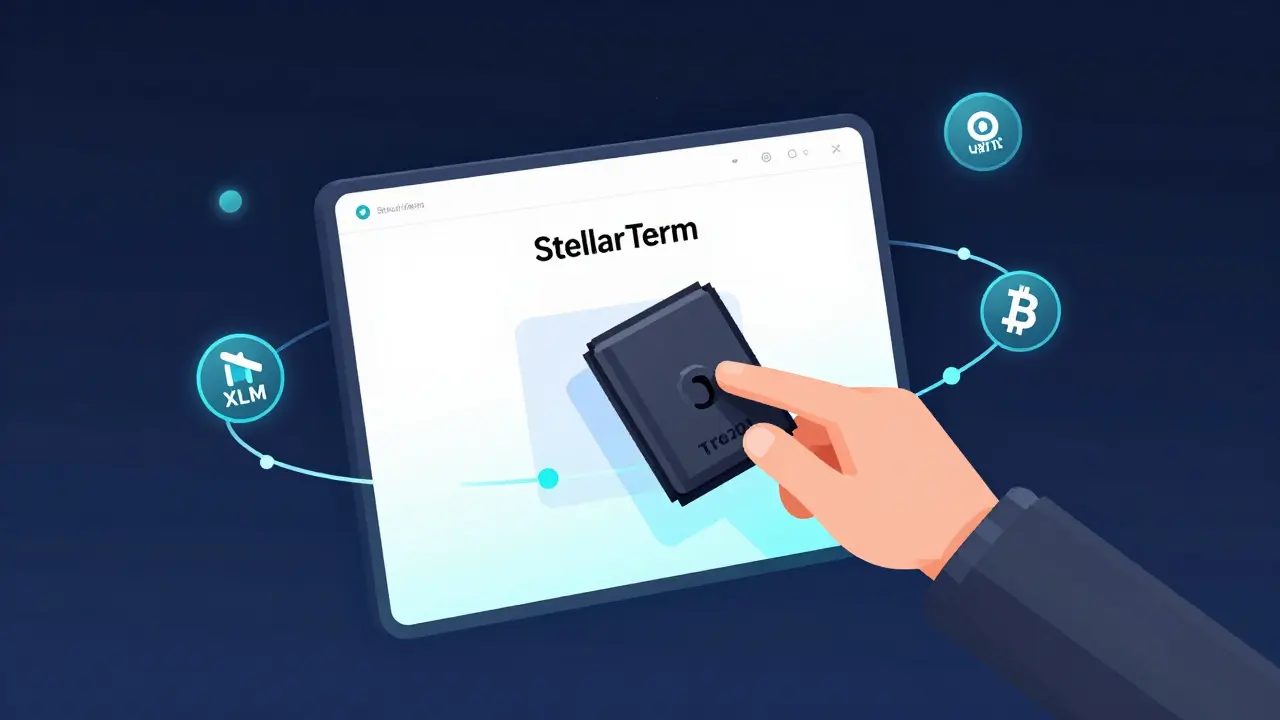
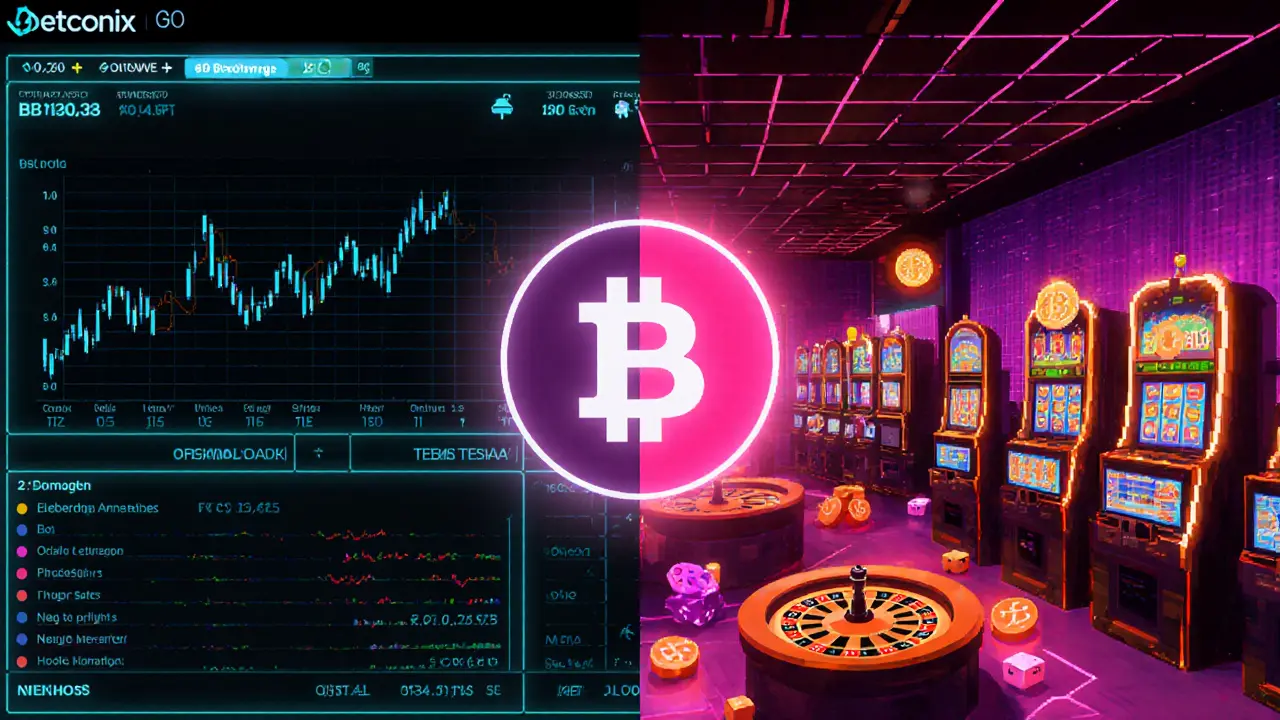

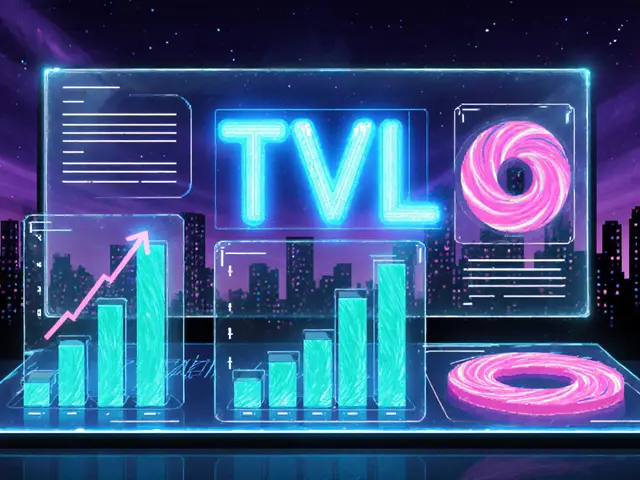
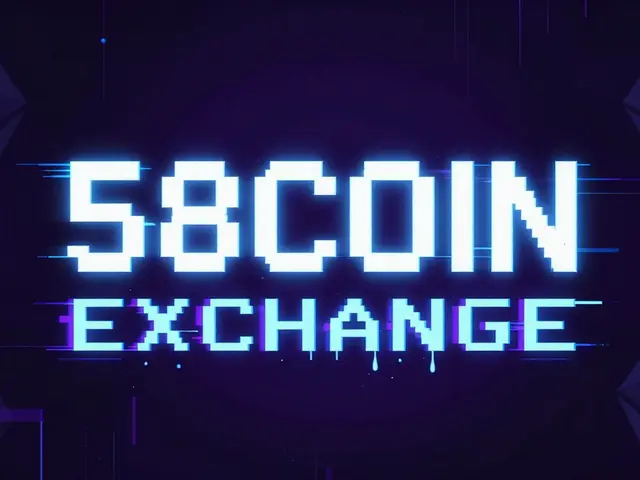

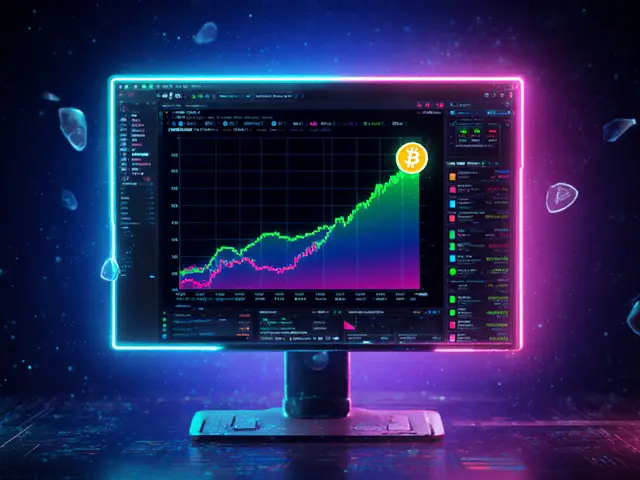
Jordan Collins
October 14, 2025 AT 08:25I appreciate the effort to lay out VSCDEX’s basics, but the lack of transparent fee schedules and audit reports makes any risk assessment speculative. The hybrid order‑book claim sounds intriguing, yet without verifiable data it remains a marketing hook. For users looking to diversify, the limited token list and sub‑$5 million daily volume suggest possible slippage issues. In practice, the “competitive fees” line offers little reassurance when you can’t compare numbers side‑by‑side with Coinbase or Kraken. Ultimately, I’d advise a cautious, test‑with‑small‑amounts approach before committing significant capital.
Andrew Mc Adam
October 15, 2025 AT 00:31Yo, you gotta love the drama of a platform that promises low‑fees but hides the numbers! It’s like they’re playing hide‑and‑seek with transparency. If they pulled a legit fee schedule outta the ether, we might actually consider it. Also, a whitepaper would be nice – just a hint of seriousness. Right now it feels like a mystery box you don’t want to open.
Marques Validus
October 15, 2025 AT 16:38Yo bro the hybrid order‑book thing is just a buzzword for what could be a rug‑pull lol no real on‑chain proof needed and the fee model is basically a black‑box that could suck your assets dry without any audit to back it up
Michael Bagryantsev
October 16, 2025 AT 08:45Reading through the comparison, it’s clear that liquidity is a major pain point for VSCDEX. Low‑cap tokens can be attractive, but without depth you risk significant price impact. I’d suggest anyone interested start with the absolute minimum deposit to test both the UI and withdrawal speeds. If the platform proves reliable on a tiny scale, then you might consider scaling up gradually.
Jason Clark
October 17, 2025 AT 00:51Sure, the “cold‑wallet” claim sounds reassuring, but without a third‑party audit it’s just a PR line. In my experience, platforms that brag about security but hide audit reports tend to have hidden vulnerabilities. If you value safety, stick with exchanges that publish comprehensive audit documents and have insurance funds.
Jim Greene
October 17, 2025 AT 16:58🤔 If you’re curious about VSCDEX, start tiny – maybe $5 worth of ETH – just to see if the deposit actually lands. 🌊 Keep an eye on the withdrawal times; any delays are a red flag. And hey, if you’re lucky the fees turn out to be low, you’ve earned a nifty little side‑hustle. 🚀 Otherwise, you’ve learned a valuable lesson without losing much.
Mandy Hawks
October 18, 2025 AT 09:05The review does a solid job of outlining the gaps without sounding overly alarmist. It’s a measured take that respects both the potential niche use‑case and the real risks involved. For a reader seeking a balanced view, this is exactly the kind of analysis that helps inform a prudent decision.
Tayla Williams
October 19, 2025 AT 01:11While the author has attempted to remain impartial, the repeated emphasis on “red flags” borders on moralizing. One could argue that a more neutral tone would better serve readers who simply need the facts to draw their own conclusions. Nevertheless, it is commendable that the review does not shy away from highlighting the platform’s deficiencies, even if the language is occasionally heavy‑handed.
Brian Elliot
October 19, 2025 AT 17:18It’s worth noting that the lack of a clear fee schedule isn’t just an inconvenience-it fundamentally undermines trust. When an exchange hides such basic cost information, users can’t accurately model their potential profits or losses. In practice, this opacity often translates to hidden charges that erode returns over time.
Jazmin Duthie
October 20, 2025 AT 09:25Sounds like a cautionary tale.
Michael Grima
October 21, 2025 AT 01:31Oh great, another “low‑fee” platform that’s really just a fee‑fog machine. If they were any more vague, they’d need a magnifying glass just to find the fee schedule. It’s almost adorable how they try to pass off “competitive” as a descriptor when there’s literally no data to back it up. I’d bet you could find a better deal on a vending machine.
Steve Cabe
October 21, 2025 AT 17:38Let’s be real: the crypto space is full of glossy promises. VSCDEX is no exception – they talk a big game about hybrid order‑books and multi‑chain magic, but the devil is in the details they refuse to share. If you’re not comfortable with that level of uncertainty, there are plenty of regulated options that actually publish their fee charts and audit results. Bottom line: treat this as high‑risk, low‑reward.
shirley morales
October 22, 2025 AT 09:45Such platforms thrive on the illusion of exclusivity while offering nothing beyond vague marketing fluff. The absence of audits, the hidden fee structure, and the minimal support all point to a product that is more about hype than substance. In an industry where trust is hard to earn, VSCDEX fails to provide any of the fundamentals that seasoned traders demand. It’s a textbook case of style over substance.
Jeff Moric
October 23, 2025 AT 01:51When you dig into VSCDEX, the first thing that jumps out is its anonymity – not in the sense of privacy, but in the sense of “we’re not showing you anything.” The exchange claims a hybrid order‑book model, yet there’s zero documentation on how settlement actually works on‑chain, which is a huge red flag for anyone worried about custody. Their fee schedule is deliberately vague; they just say “competitive” without publishing maker‑taker rates, so you can’t even calculate whether trades will be profitable after costs. Liquidity is another sore point – with daily volumes hovering around $3 million, you’re likely to experience slippage, especially on low‑cap tokens that the platform seems to specialize in. The lack of a public audit or any third‑party security review means you’re essentially trusting a black box with your funds, and in a landscape where hundreds of exchanges publish full audit reports, that’s concerning. Regulatory status is equally murky; there’s no evidence of licenses from any major financial authority, which could expose users to sudden shutdowns or legal trouble. Customer support is limited to email, and anecdotal reports suggest response times can be days, not minutes, making issue resolution a nightmare. On the upside, if you need a token that isn’t listed anywhere else, VSCDEX might be the only gateway, but that narrow utility hardly justifies the broader risks. For most traders, especially beginners or institutions, the cons overwhelmingly outweigh the niche benefit. My recommendation: treat VSCDEX as a “high‑risk sandbox,” test with the smallest amount you can afford to lose, and keep a close eye on withdrawal speeds and any unexpected fees. If you find the platform reliable after a few small trades, you can consider increasing exposure, but never commit large sums without independent verification of its security and fee structure. In short, proceed with extreme caution, and always have a fallback plan to move your assets to a more established exchange if anything feels off.
Bruce Safford
October 23, 2025 AT 17:58So you think VSCDEX is a secret weapon? Think again – the lack of any verifiable data is exactly what fraudsters love. They hide behind fancy buzzwords and hope you don’t ask the hard questions. If you’re not willing to dig deep, you’ll probably end up losing money in a place that disappears overnight. Stay skeptical and keep your assets where you can actually verify the security measures.
Shrey Mishra
October 24, 2025 AT 10:05The promise of a hybrid exchange is alluring, yet the absence of concrete details makes it feel like a theatrical performance without a script. From a security standpoint, the claim of cold‑wallet storage is meaningless without a publicly available audit, and the vague KYC policy raises questions about regulatory compliance. In an industry where transparency is increasingly demanded, VSCDEX’s opacity is a serious drawback that warrants cautious scrutiny.
Ken Lumberg
October 25, 2025 AT 02:11It’s shameful how many platforms like VSCDEX operate in the shadows, ignoring the basic responsibilities they owe to users. The unchecked claims and lack of oversight reflect a broader problem in the crypto ecosystem, where hype often eclipses accountability. Users deserve better than vague promises and hidden fees – it’s time the industry demanded real standards.
Blue Delight Consultant
October 25, 2025 AT 18:18From a philosophical perspective, the reluctance to disclose vital operational details signals a deeper ethical dilemma. When an exchange does not prioritize transparency, it inadvertently erodes the trust that underpins the entire crypto community. Such practices may ultimately hinder the broader adoption of decentralized finance.
Wayne Sternberger
October 26, 2025 AT 09:25The formal tone of VSCDEX’s marketing materials suggests professionalism, yet the absence of verifiable data contradicts that image. In regulated financial services, disclosures are mandatory; the omission here is conspicuous. Prospective users should weigh the potential benefits against the clear lack of transparency before committing funds.
Gautam Negi
October 27, 2025 AT 01:31While the hybrid approach sounds innovative, the reality is that without audited contracts and clear fee structures, the model remains speculative. Users should demand concrete evidence before trusting their assets to an unproven platform. Until then, the risk outweighs any theoretical advantage.
Shauna Maher
October 27, 2025 AT 17:38If you think the lack of regulation is just a minor inconvenience, you’re dangerously naive – it’s a ticking time bomb that could explode and leave you penniless. The crypto world is already riddled with scams; platforms like VSCDEX are the worst kind because they hide in plain sight, pretending to be legit while offering no accountability. Wake up and demand real transparency, or you’ll be the next victim of a hidden rug‑pull.